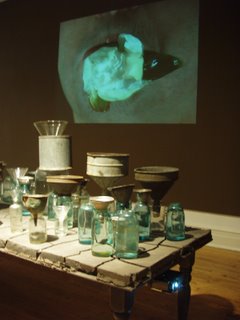Q. What most interests you?
A. Spatial negotiations and the intersections between human relationships and the landscape. With whom and how do we share our physical, psychological, intellectual, emotional, personal and political space? Much of life is about negotiating space. Two countries could be fighting over land and where the boundary lines may be. Someone may see a section of land as sacred and another as a great profit-making venture. A couple may be trying to establish psychological and physical space within their relationship and home. Someone else may be trying to figure out how much space they are going to let a spoken or written word occupy their own mind.

Q. Has your artwork ever caused a scandal that you did not anticipate? Did the experience change the way you perceived your art? Did it change the way you make art?
A. The closest I can come to addressing this question is with one of the pieces I included in the
Overflow exhibition, titled Flowers from the Mouth. This video installation was a source of conflict between curators for one group exhibition. One curator felt strongly about Flowers from the Mouth and another was repulsed by it and felt it had too strong a sexual undercurrent.
When I showed up for the opening, the piece appeared to be missing and a 2-page controversy was in its place. Later, I looked up and realized my piece was being projected in the space above the rest of the exhibition.
The experience didn't really change the way I make art but it made me more aware of how many different ways a work can be perceived depending on the community and experiences of the viewer engaging with the work.
Q. What has been your favorite reaction to your artwork?
A. Again it would also be with Flowers from the Mouth. I have shown this work in 5 different locations and each time it has had such split reactions. I showed the piece in Fort Collins, Colorado, at the Museum of Contemporary Art. There was a comment box at the show and after the exhibition ended they mailed me the comments that related to my work. They ranged from "It was the most beautiful and poetic work" to "if the museum ever showed a piece like this again they would never return." This range of reaction to Flowers initially surprised me. I have never really viewed it as controversial - it was just a piece I thought about for a long time and really needed to make.
Q. When you are speaking to young artists about their art practice, what do you most want them to learn from you?
A. To remember that art is both an intuitive and intellectual practice. Making art is a balancing act between following our gut instincts, thoughtfully considering what it is we are saying as artists and how our work exists in the world. Art is a conversation and can be used as a form of personal understanding and objectification, but it is also a necessary form of social engagement.


No comments:
Post a Comment